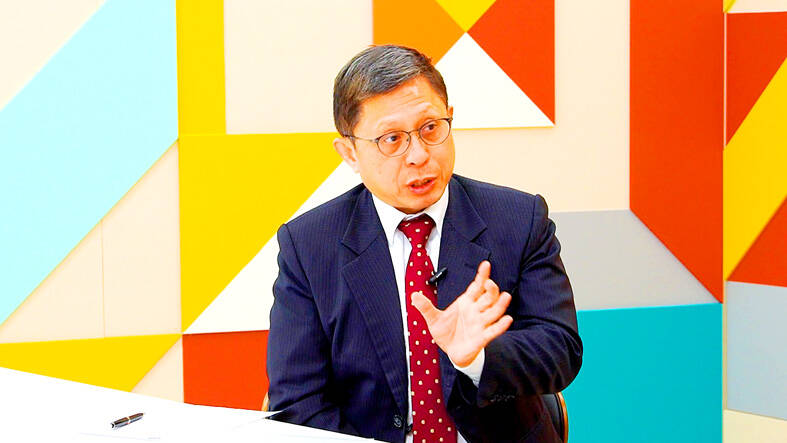The National Communications Commission (NCC) has reached a rental agreement to continue operations until September, but budget cuts are threatening its operations after that, NCC Secretary-General Huang Wen-che (黃文哲) told the Chinese-language Liberty Times (sister paper of the Taipei Times) in an interview published yesterday.
The NCC’s proposed operating expenses for this year were cut in half and another 10 percent was frozen, leaving the commission with only NT$37.58 million (US$1.15 million), Huang said.
The NCC needs NT$25.61 million to rent office space, he said.

Photo: Chang Shou-kuei, Taipei Times
If the NCC were to pay rent as usual, it would only be able to maintain operations through this month, and would not be able to pay for water and electricity, he said, adding that it would mean public services and those for telecommunications providers would be forced to halt.
The NCC has reached an agreement with its landlord, the Taiwan Postal Association, to delay rental payments, allowing it to prioritize funds for other expenses, including utilities, and continue operations into September, Huang said.
The NCC would explore other options with utilities providers to delay payments, but its budget was submitted with all expenses in mind, he said.
Even if it were to successfully petition the Legislative Yuan to access the frozen 10 percent of its funds, it would only extend operations by one month, he added.
It is not normal for government organizations to ask utility providers and landlords for permission to delay payments, Huang said, calling on the legislature to understand the NCC’s difficulties.
The commission was also unable to process extension applications for permits and licenses in the broadcasting industry, as it did not have enough committee members to reach a quorum, he said.
There are 37 operators whose permits are due for renewal or have already expired.
Following the exit of Wong Po-tsung (翁柏宗) as NCC vice chairman in November last year after an amendment to the National Communications Commission Organization Act (國家通訊傳播委員會組織法) banning NCC members from serving more than two terms, it has only three members and could not form a quorum, which requires four.
The NCC is asking platforms and service providers to allow broadcasters whose applications could not be processed to continue airing their programs, Huang said, but added that the NCC recognizes that such actions carry legal risks.

The manufacture of the remaining 28 M1A2T Abrams tanks Taiwan purchased from the US has recently been completed, and they are expected to be delivered within the next one to two months, a source said yesterday. The Ministry of National Defense is arranging cargo ships to transport the tanks to Taiwan as soon as possible, said the source, who is familiar with the matter. The estimated arrival time ranges from late this month to early next month, the source said. The 28 Abrams tanks make up the third and final batch of a total of 108 tanks, valued at about NT$40.5 billion

Two Taiwanese prosecutors were questioned by Chinese security personnel at their hotel during a trip to China’s Henan Province this month, the Mainland Affairs Council (MAC) said yesterday. The officers had personal information on the prosecutors, including “when they were assigned to their posts, their work locations and job titles,” MAC Deputy Minister and spokesman Liang Wen-chieh (梁文傑) said. On top of asking about their agencies and positions, the officers also questioned the prosecutors about the Cross-Strait Joint Crime-Fighting and Judicial Mutual Assistance Agreement, a pact that serves as the framework for Taiwan-China cooperation on combating crime and providing judicial assistance, Liang

A group from the Taiwanese Designers in Australia association yesterday represented Taiwan at the Midsumma Pride March in Melbourne. The march, held in the St. Kilda suburb, is the city’s largest LGBTQIA+ parade and the flagship event of the annual Midsumma Festival. It attracted more than 45,000 spectators who supported the 400 groups and 10,000 marchers that participated this year, the association said. Taiwanese Designers said they organized a team to march for Taiwan this year, joining politicians, government agencies, professionals and community organizations in showing support for LGBTQIA+ people and diverse communities. As the first country in Asia to legalize same-sex

MOTIVES QUESTIONED The PLA considers Xi’s policies toward Taiwan to be driven by personal considerations rather than military assessment, the Epoch Times reports Chinese President Xi Jinping’s (習近平) latest purge of the Chinese People’s Liberation Army (PLA) leadership might have been prompted by the military’s opposition to plans of invading Taiwan, the Epoch Times said. The Chinese military opposes waging war against Taiwan by a large consensus, putting it at odds with Xi’s vision, the Falun Gong-affiliated daily said in a report on Thursday, citing anonymous sources with insight into the PLA’s inner workings. The opposition is not the opinion of a few generals, but a widely shared view among the PLA cadre, the Epoch Times cited them as saying. “Chinese forces know full well that